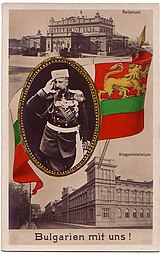Second Battle of Cobadin
| Second Battle of Cobadin | |||||||
|---|---|---|---|---|---|---|---|
| Part of the Dobruja Campaign of the Romanian Campaign of World War I | |||||||
 Stefan Toshev and Mustafa Hilmi Pasha observing the fighting around Medgidia | |||||||
| |||||||
| Belligerents | |||||||
|
|
| ||||||
| Commanders and leaders | |||||||
|
|
| ||||||
| Strength | |||||||
|
Total: 96 battalions and 28 squadrons; 71,581+ riflemen [1] |
Total: 116 battalions and 40 squadrons[1] | ||||||
| Casualties and losses | |||||||
| Total: 17,007+ [2] |
Heavy including 6,700 captured (from 19 to 21 October alone)[3] | ||||||
The Second Battle of Cobadin took place from 19 to 25 October 1916 between the Central Powers, chiefly the Bulgarian Third Army, and the Entente, represented by the Russo–Romanian Dobruja Army. The battle ended in a decisive victory for the Central Powers; it resulted in the occupation of the strategic port of Constanța and the capture of the railway between that city and Cernavodă.
The battle
[edit]The Romanian Second Army, led by major general Alexandru Averescu, fielded the following units:
- 2nd Infantry Division, commanded by brigadier general Alexandru Socec.[4]
- 5th Infantry Division, commanded by brigadier general Alexandru Hartel.
- 9th Infantry Division, commanded by brigadier general Constantin Scărișoreanu
- 12th Infantry Division, commanded by brigadier general Traian Găiseanu.
- 15th Infantry Division, commanded by brigadier general Eremia Grigorescu.
- 5th Călărași Brigade, commanded by colonel Constantin Carataș.
The Russian Dobruja Army, led by general Andrei Zayonchkovski, comprised the 47th Army Corps. Its main components were:
- 61st Infantry Division, commanded by major general Panteleimon Nikolaevich Simanski.
- 115th Infantry Division, commanded by major general Lev Lvovich Baikov.
- 3rd Cavalry Division, commanded by lieutenant general Evgeniy Aleksandrovich Leontovich.
- First Serbian Volunteer Division, commanded by colonel Stevan Hadžić.
The Bulgarian Third Army, led by lieutenant general Stefan Toshev, comprised the following units:
- 1st Infantry Division, commanded by brigadier general Ianko Draganov.
- 4th Infantry Division, commanded by brigadier general Panteley Kiselov.
- 6th Infantry Division, commanded by brigadier general Stefan Popov.
- Combined Division, commanded by major general Todor Kantardzhiev.
- 1st Cavalry Division, commanded by major general Ivan Kolev.
Aftermath
[edit]Battle of the Danube Delta
[edit]Despite the loss of most of Dobruja to the Central Powers, the Romanian defensive victory at Tulcea in January 1917, combined with the actions of the Romanian cruiser Elisabeta at the mouths of the Danube, ensured Romanian control over the entire Danube Delta throughout the rest of the War.[5]
See also
[edit]References
[edit]- ^ a b Тошев (2007), page 184
- ^ a b c Министерство на войната (1943), page 870-873
- ^ Марков, Георги. Голямата война и българската стража между Средна Европа и Ориента 1916-1919 г. Академично издателство „Проф. Марин Дринов”. София 2006. ISBN 954-322-072-7, стр. 44
- ^ "Inventar. General Socec Alexandru. 1877–1951" (PDF). arhivelenationale.ro. National Archives of Romania. Retrieved November 9, 2023.
- ^ Mihai Giurescu, Warship International, Volume 21 , p. 166
Sources
[edit]- Министерство на войната, Щаб на войската (1943). Българската армия в Световната война 1915–1918, Vol. IX. Държавна печатница, София.
- Kirițescu, Constantin (1922). Istoria războiului pentru întregirea României: 1916–1919. București: România Nouă. OCLC 935411585.
- Тошев, Стефан (2007). Действията на III армия в Добруджа през 1916 год. Захарий Стоянов. ISBN 978-954-739-976-1.
- Pollard, A.F. (2006). A Short History of the Great War. BiblioBazaar. ISBN 978-1-4264-2180-8.
- Battles of World War I involving Romania
- Battles of World War I involving Germany
- Battles of World War I involving Bulgaria
- Battles of World War I involving the Ottoman Empire
- Battles of World War I involving Russia
- Battles of the Balkans Theatre (World War I)
- History of Dobruja
- Battles in 1916
- 1916 in Bulgaria
- 1916 in Romania
- Naval battles involving Romania
- October 1916 events


